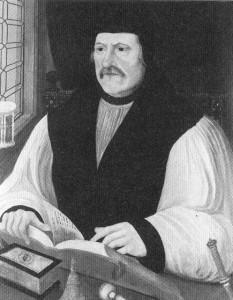 Sometime around 26th April, Queen Anne Boleyn met with her chaplain Matthew Parker and asked him to watch over her two year-old daughter. We don’t know what was said, but when he was offered the post of Elizabeth I’s Archbishop of Canterbury in 1558, a post which he did not believe that he was right for or fit enough for (he’d had a nasty fall from a horse), Parker wrote to Sir Nicholas Bacon:
Sometime around 26th April, Queen Anne Boleyn met with her chaplain Matthew Parker and asked him to watch over her two year-old daughter. We don’t know what was said, but when he was offered the post of Elizabeth I’s Archbishop of Canterbury in 1558, a post which he did not believe that he was right for or fit enough for (he’d had a nasty fall from a horse), Parker wrote to Sir Nicholas Bacon:
“though my heart would right fain serve my sovereign lady the Queen’s majesty, in more respects than of mine allegiance, not forgetting what words her grace’s mother said to me of her, not six days before her apprehension, yet this my painful infirmity will not suffer it in all manner servings…”
In 1572, in a letter to William Cecil, Lord Burghley, Parker wrote of how he had only accepted the position of Archbishop of Canterbury because of his promise to Anne Boleyn:
“Yea, if I had not been so much bound to the mother, I would not so soon have granted to serve the daughter in this place…”
As Eric Ives wrote, “That charge, and the debt he felt he owed to Anne, stayed with him for the rest of his life.” It was enough of a promise for him to take a job that he didn’t want.
Did Anne Boleyn know that there was a plot against her? Was it just a coincidence that she spoke to Parker about this just days before her arrest? Was it just Elizabeth’s spiritual welfare she was talking about? We will never know because Parker does not give any more detail about the conversation.
Matthew Parker was a member of an influential group of men who were responsible for the future Elizabeth I’s education and for aiding in her subsequent rise to power, so Anne was putting her daughter in good hands. You can read more about these men and their influence in Robert Parry’s article The Cambridge Connections.
Notes and Sources
- Parker, Matthew The Correspondence of Matthew Parker, D.D., Archbishop of Canterbury:
Comprising Letters Written by and to Him, from A.D. 1535, to His Death, A.D. 1575 (edited for the Parker Society by John Bruce, and Thomas Thomason Perowne, 1853), p59 and 391 - Ives, Eric (2004) The Life and Death of Anne Boleyn, Blackwell Publishing, p267